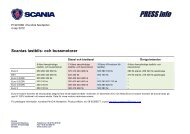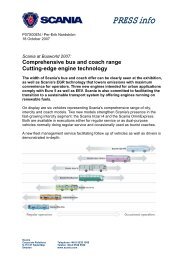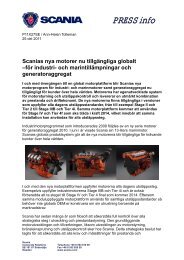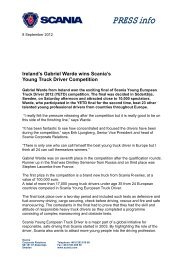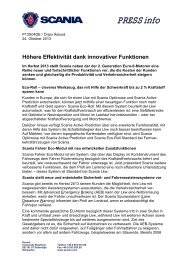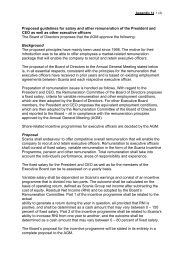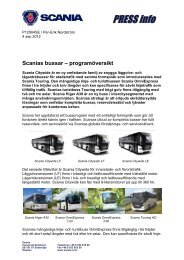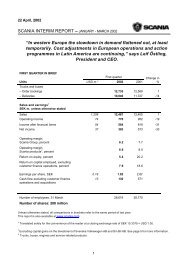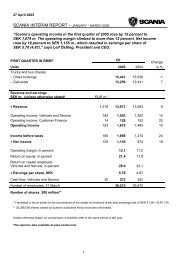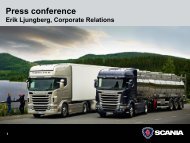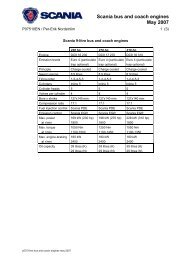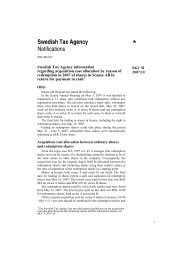Scania Annual Report 2011
Scania Annual Report 2011
Scania Annual Report 2011
You also want an ePaper? Increase the reach of your titles
YUMPU automatically turns print PDFs into web optimized ePapers that Google loves.
92<br />
notes to the consolidated financial statements<br />
NOTE 1 Accounting principles, continued<br />
Leases<br />
• Operating lease – in case of delivery of vehicles that <strong>Scania</strong> finances<br />
with an operating lease, revenue is allocated on a straight-line basis<br />
over the lease period. The assets are recognised as lease assets in<br />
the balance sheet.<br />
• Residual value obligation – in case of delivery of vehicles for which<br />
substantial risks remain with <strong>Scania</strong> and on which <strong>Scania</strong> has a<br />
repurchase obligation at a guaranteed residual value, revenue is<br />
allo cated on a straight-line basis until the repurchase date, as with<br />
an operating lease.<br />
• Short-term rental – in case of short-term rental of vehicles, revenue<br />
is allocated on a straight-line basis over the contract period. Leasing<br />
and rentals mainly involve new trucks and buses. In such cases, the<br />
asset is recognised in the balance sheet as a lease asset.<br />
Service-related products<br />
Income for service and repairs is recognised as income when the<br />
service is performed. For service and repair contracts, income is<br />
allo cated over the life of the contracts, as expenses for the fulfilment<br />
of the contract arise.<br />
Financial Services<br />
In case of financial and operating leases, with <strong>Scania</strong> as the lessor,<br />
the recognition of interest income and lease income, respectively,<br />
is allocated over the lease period. Other income is recognised on a<br />
continuous basis.<br />
MISCELLANEOUS<br />
Related party transactions<br />
Related party transactions occur on market terms. “Related parties”<br />
refer to the companies in which <strong>Scania</strong> can exercise a controlling or<br />
significant influence in terms of the operating and financial decision s<br />
that are made. The circle of related parties also includes those companies<br />
and physical persons that are able to exercise a controlling or<br />
significant influence over the financial and operating decisions of the<br />
<strong>Scania</strong> Group.<br />
Related party transactions also include defined benefit and defined<br />
contribution pension plans.<br />
Government grants including EU grants<br />
Government grants received that are attributable to operating<br />
expense s reduce these expenses. Government grants related to<br />
investments reduce the gross cost of non-current assets.<br />
Contingent liabilities<br />
A contingent liability is a possible obligation that arises from past<br />
events and whose existence will be confirmed only by the occurrence<br />
or non-occurrence of one or more uncertain future events. A contingen<br />
t liability can also be a present obligation that is not recognised<br />
as a liability or provision because it is not probable that an outflow of<br />
resources will be required, or because the amount of the obligation<br />
cannot be measured with sufficient reliability.<br />
Earnings per share<br />
Earnings per share are calculated as net income for the period attributable<br />
to Parent Company shareholders, divided by the weighted average<br />
number of shares outstanding per report period.<br />
Incentive programmes and share-based payment<br />
The outcome of the incentive programme for executive officers is<br />
recognised as a salary expense in the year the payment is related to.<br />
Part of the programme is payable in such a way that the employee him/<br />
herself acquires shares in <strong>Scania</strong> AB at market price (see Note 28,<br />
“Compensation to executive officers”). As a result, the rules according<br />
to IFRS 2, “Share-based payments”, are not applicable.<br />
CHANGES IN ACCOUNTING PRINCIPLES DURING THE NEXT YEAR<br />
New standards, amended standards and interpretations that enter<br />
into force on 1 January 2012 and subsequently have not been applied<br />
in advance. The following new and amended standards have not<br />
yet begun to be applied. None of the following standards have been<br />
approve d by the EU at present, which is a requirement for the adoption<br />
of the standard.<br />
IFRS 9, “Financial Instruments” – This standard replaces the provisions<br />
of IAS 39, “Financial Instruments: Recognition and Measurement”<br />
that relate to classification and measurement. The standard is mandatory<br />
starting with the financial year 2015, but earlier adoption is permitted,<br />
provided that the EU has approved the standard. This has not yet<br />
occurred.<br />
IFRS 10, “Consolidated Financial Statements” – The standard<br />
replaces IAS 27 and SIC-12, “Consolidation – Special Purpose Entities”<br />
and contains a model for assessing whether or not control exists. An<br />
entity or investment should be included in the consolidated statement s<br />
if control exists based on a control concept. The standard enters into<br />
force on 1 January 2013 and shall be applied on this date. The standard<br />
is not expected to have any material impact on <strong>Scania</strong>’s financial statements.<br />
IFRS 11, “Joint Arrangements” – The standard replaces IAS 31,<br />
“Inte rests in Joint Ventures”. According to the standard, jointly controlled<br />
investments shall be divided into two categories, joint venture<br />
or joint operation. Different accounting rules shall be applied to the<br />
two categories. The standard enters into force on 1 January 2013 and<br />
shall be applied on this date. The standard is not expected to have any<br />
material impact on <strong>Scania</strong>’s financial statements.<br />
IFRS 12, “Disclosure of Interests in Other Entities” contains new disclosure<br />
requirements for all types of interests in other entities irrespective<br />
of whether the interest is consolidated or not. The standard enters<br />
into force on 1 January 2013 and shall be applied on this date.<br />
IFRS 13, “Fair Value Measurement” – The standard is being introduced<br />
to create a uniform definition of fair value and uniform valuation<br />
methods for measurement of fair value. New disclosure requirements<br />
are also being introduced. The standard enters into force on 1 Januar y<br />
2013 and shall be applied for annual periods starting in 2013. The<br />
standard is not expected to have any material impact on <strong>Scania</strong>’s<br />
financial statements.<br />
financial reports <strong>Scania</strong> <strong>2011</strong>



